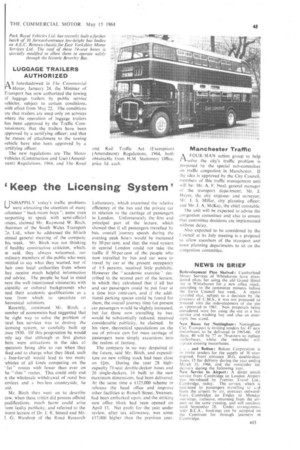Keep the Licensing System'
Page 47

If you've noticed an error in this article please click here to report it so we can fix it.
UNHAPP1LY today's traffic problems were attracting the attention of many rolunteer "back-room boys ", some even tarporting to speak with semi-official mices, claimed Mr, Raymond W. Birch, :hairman of the South Wales Transport o. Ltd., when he addressed the fiftieth virtual general meeting of the company his week. Mr. Birch was not thinking )1 healthy constructive criticism, which, le said, they always welcomed, nor )rdinary members of the public who were ratitled to say what they wanted, nor of heir own local authorities from whom hey receive much helpful information md advice. The people he had in mind vere the well-intentioned visionaries with teientific or cultural backgrounds who ised their academic qualifications as a lase from which to speculate on heoretical solutions.
Recently, continued Mr. Birch, a lumber of economists had suggested that he right way to solve the problem of 'ural bus services was to destroy the icensing system. so carefully built up ;ince 1930_ Of this proposition he would >nly say that although at first glance here were attractions in the idea of )perators being able to run when they iked and to charge what they liked, such
free-for-all would lead to too many 7ehicles of all kinds competing on the ' fat " routes with fewer than ever on he " thin " routes. This could only end n the wholesale withdrawal of rural bus -ervices and a bus-less countryside, he aid.
Mr. Birch then went on to describe low, when these critics did possess official pialifications, much . harm could arise *rom faulty publicity, and referred to the 'ecent lecture of Dr. J. R:Smeed and Mr.
G. Wardrop of the Road Research Laboratory, which examined the relative efficiency of the bus and the private car in relation to the carriage of passengers in London. Unfortunately the first and principal part of the lecture, which showed that if all passengers travelled by bus, overall journey speeds during the evening peak hours would be increased by 50 per cent. and that the road system in central London could not take the traffic if 50 per cent of the people who now travelled by bus and car were to travel by car at the present occupancy of 1.5 persons, received little publicity. However the " academic exercise '' described in the second part of the lecture, in which they calculated that if all bus and car passengers could be put four at a time into mini-cars, and if the additional parking spaces could be found for them, the overall journey time for present car passengers would be slightly increased, but for those now travelling by bus. would be substantially reduced, received considerable publicity, he claimed. In his view, theoretical speculations on the use of private cars for mass carriage of passengers were simply excursions into the realms of fantasy.
The company in no way despaired of the future, said Mr. Birch, and expenditure on new rolling stock had been close on :Elm. During the year 28 highcapacity 71-seat double-decker buses and 26 single-deckers, 14 built to the new maximum dimensions, had been delivered. At the same lime a £125,000 scheme to rehouse the head office and improve Other facilities at Russell Street, Swansea. had been embarked upon. and the striking new office block had been opened on April 15. Net profit for the year under review, after tax allowance, was some £17,000 higher than the previous year.




































































































































